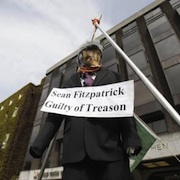
Tension is increasing within the Dublin coalition government over its continuing attempts to maintain the nationalised Anglo Irish Bank as a going concern.
Irish taxpayer funds are being pumped into the fraudulent financial institution at a rate of about ten billion euro a year. It is feared the total cost to the 26-County exchequer of the government’s bailout of Anglo could ultimately reach over fifty billion euro, or about half the national debt of the 26-County state.
The Green Party, the junior partners in the coalition government, is now calling for Anglo to wind down its operations.
Current plans to carve out a so-called “good” [rebranded and recapitalised] bank is also facing serious opposition from the powerful European Commission.
Green Party chairman Dan Boyle said earlier today [Monday] that a wind-down of State-owned Anglo Irish Bank should take no more than “four and five years”.
It was a desperate public u-turn which has piled pressure on the Fianna Fail-led government.
“What we are not saying is that there can be an immediate shutdown of Anglo, that is still by far the most expensive option,” said Mr Boyle.
The Green Party has become deeply unpopular over its failure to challenge the corruption and cronyism of its larger coalition partners. Fianna Fail has been largely blamed by the Irish public for the economic collapse through its support of the bankers and developers who together fuelled the ‘Celtic Tiger’ asset bubble.
The Green party is also increasingly being identified with new taxes which are being introduced to help pay for the bailouts. Senior party representatives are said to be facing annihilation at the polls in the next general election unless an escape plan is found.
The two Green ministers, John Gormley and Eamon Ryan, are expected to tell their government colleagues at a Cabinet meeting on Wednesday that the party no longer supports government policy on Anglo.
The Greens’ change of heart comes as the bank prepares to report further substantial losses tomorrow - when Anglo publishes accounts for the first half of the year - and the need for a further capital injections of several billion euro.
The opposition parties have blasted the infamous bank as an accounting ‘black hole’ and want it to shut down.
Fine Gael’s finance spokesman Michael Noonan criticised the Green Party over the manner in which it was addressing the Anglo issue.
“I don’t think they’re doing it properly,” he said. “I think the Green ministers should have discussed this in private with their Fianna Fail colleagues and announced an agreed plan.”
“By doing it they way they’re doing it, they’re adding a political instability to the financial instability and if it’s not concluded quickly they’ll make matters worse rather than better,” he added.
Sinn Fein spokesperson on Finance Arthur Morgan said the Green party’s policy change had come “very late in the day”.
As partners in government, the Greens could not “shirk their share of the blame for the current crisis facing this country as they have been supporting Fianna Fail’s approach to Anglo Irish and the banking sector up until now,” he said.
“Anglo Irish bank has been a leech on the life-force of this economy and the diversion of taxpayer’s money into keeping this abomination open has not only taken much needed funds out of the real economy, it has resulted in repeated downgrades of our credit rating and has increased costs of future borrowing.”
Mr Morgan said the Irish banking system should be “reconfigured”, including the nationalisation of the state’s two main banks, so that households and businesses have access to credit at fair rates and people “in genuine trouble” financing their mortgage commitments could be helped.
JOBS NOT BAILOUTS
Meanwhile, hundreds of people marched through the centre of Dublin at the weekend calling on the government to tackle unemployment and stem the flow of young people emigrating from Ireland.
Saturday’s Reclaim the City festival focused on unemployment figures and criticised the Government over what organisers claim has been an inadequate solution to a “demoralising situation for Ireland’s youth”.
Organised by the Right To Work Campaign, the festival began with a protest march through the city to the Central Bank in Temple Bar.
Protesters waved anti-Government placards and chanted slogans denouncing cutbacks. “We want jobs, not Anglo bailouts,” read some of the slogans.
Sinn Fein Councillor Dessie Ellis said the biggest lie from the coalition government was that there is no alternative to the savage cutbacks and mass unemployment.
“Current policy seems to consist of attacking those on low wages and social welfare. This is not just a short sighted policy, it is an anti social one.
“We are told we need to tighten our belts, cut back, have a lower standard of living while the government bends over backwards to bail out bankers and big business.”
![[Irish Republican News]](https://republican-news.org/graphics/title_gifs/rn.gif)
![[Irish Republican News]](https://republican-news.org/graphics/title_gifs/harp.gif)

